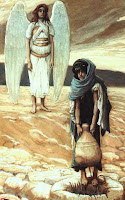Omni-vision

Among the names for God, there is one called "the God who sees me." If you believe in God, then you would probably believe that God sees you. But what the name implies is that God lets you know that he sees you and when God lets you know he sees you, he reveals to you how he sees you and you see yourself and God differently after the encounter.
The person who had such an encounter and named God "the God who sees me" is Hagar, and the story is found in Genesis 16: "The angel of the LORD found her by a spring of water in the wilderness, the spring on the way to Shur." The Hebrew word for "spring" also means "eye." This is the first time that the angel of the Lord visits anyone in scripture. Hagar's vision of Sarai has just changed and she's about to receive new vision from God. This is also the first time in the story of Hagar that anyone has spoken to her: "And he said, "Hagar, servant of Sarai, where have you come from and where are you going?" She said, "I am fleeing from my mistress Sarai.""
The theophony speaks to her, gets onto the subject of her origin and her destiny. She answers, telling of her distressed flight. The messenger's answer is bad news and good news: The angel of the LORD said to her, "Return to your mistress and submit to her." The angel of the LORD also said to her, "I will surely multiply your offspring so that they cannot be numbered for multitude." And the angel of the LORD said to her, "Behold, you are pregnant and shall bear a son. You shall call his name Ishmael, because the LORD has listened to your affliction. He shall be a wild donkey of a man, his hand against everyone and everyone’s hand against him, and he shall dwell over against all his kinsmen."
Phyllis Trible's comment on the text is, "Hagar's unbearable past becomes her future; her origin in suffering becomes her destiny in suffering. Second, the messenger promises Hagar innumerable descendants, thereby according her the special status of being the only woman in the Bible that has received such a promise. Beyond her destiny of suffering, then, lies a future of progeny. Third, the messenger confirms Hagar's conceiving."
The messenger specifies the name of the child and its meaning that God has listened to your affliction, but at the same time, sends her back into it and predicts a future of affliction for the boy, with the consolation stamped to his life that God will be listening. Hagar and Ishmael's difficult life is decreed by God with blessing.
Hagar's response is to do something no one else has done, to name God. She says that God has seen her and this is God's name that she gives God. She also remarks that she herself has seen God and lived: "So she called the name of the LORD who spoke to her, "You are a God of seeing," for she said, "Truly here I have seen him who looks after me." Therefore the well was called Beer-lahai-roi; it lies between Kadesh and Bered."
Hagar has become the first theologian. She has had an experience and been given a word and she gains an insight. Her life now becomes her life after theophany, forever changed.
___________________
Phillis Trible, "Hagar, Sarah, and their children: Jewish, Christian, and Muslim perspectives"; Westminster John Knox Press, 2006; pp. 40-41
Comments
Post a Comment